#same with Metternich and Wellington
Explore tagged Tumblr posts
Text
Can’t pass on such an amazing topic for discussion and leave it without any commentary from my part!
Even though I pretty much stopped posting about Austrian affairs in the Napoleonic era, I’m still fascinated by the subject and would love to see some piece of media focusing on Imperial strifes and struggles during the exact same time period. And since nobody wants to do anything, I’d love to do it myself! If I only had such an opportunity. 🇦🇹✨
Like… those events made such an impact on a scale of European and world history. Yet it seems, that despite vast historical research being carried out on the Habsburg’s monarchy general public tends to know literally nothing about fundamentals. The fall of the Holy Roman Empire was not something that occurs every now and then. And people who lived through this whole mess were not just some boring imperialists, reactionaries and conservatives. 🤡
(Frankly speaking, many of them were all of those things at once… Still I whole-heartedly believe that they can be unbelievably captivating and deserve to be explored too!)
Documentaries are always appreciated, however I’d kill for a fully-fledged series about Kaiser Franz, his mind-blowing family and his court because oh man, what a court it was. Also, we desperately need a proper series about the Congress of Vienna! At least 4 seasons of drama, political intrigues and scandalous love affairs. It could be a show of a century! 😩🤌
My bad: I’ve started talking about series - not films - from the beginning, since, in my opinion, themes that I’ve mentioned require series and only series. There are so many things to explore, no film would be able to depict even a hundredth of what is needed to be shown.
Nevertheless, if we get back to the “film” topic, I’ll definitely ask for a decent biopic about Metternich without caricature exaggeration of his evilness and narrow-mindedness. 👏 Metternich 👏 has 👏 rights 👏 too 👏! That eccentric man was broken beyond repair by life-circumstances and it’s unbelievably tragic to witness, what a person could become because of their predisposition and bias.
At last, just to make this whole rant even worse…
Schwarzenberg.
Like, anything focusing him to let people know about someone who confronted Napoleon (much more complexly and excitingly, from my point of view, sorry not sorry) aside tsar Alexander and Wellington.
Das Ende der Geschichte. 😑
Your Ideal Napoleonic Era Movie
If someone gave you like Insane James Cameron Avatar money to make a Napoleonic film and every perfect actor, choreographer, screenwriter, and other logistics you needed was available to you, what you would do?
I'm just curious. I was discussing with a friend about how it was physically impossible to do the entirety of Naps' career in one movie in a satisfactory manner due to the absolute length of his military career.
But I had nothing cognizant to suggest for a movie about Napoleon.
The only thing I want is having the Napster sitting on his secretary's lap for no reason ever provided.
The guy was like a cat with ADHD from what I figure.
Maybe I just want guys chilling in an explicitly not 20th-21st century "we gotta No Homo everything" way.
And obviously, if I had more money on my hands than I knew what to do with for a Napoleonic film, I would hire the prettiest man for a Louis-Francois Lejeune biopic. xD
#historical film#klemens von metternich#karl zu schwarzenberg#napoleonic era#napoleonic wars#austrian empire#19th century
80 notes
·
View notes
Text
Carnival time so yeah - stupid costume ideas for a silly costume party
Napoleon is wearing the same Julius Caesar costume he has worn to every single event that requires costumes since he was 18. He is so in-character that it’s hard for the others to know exactly when he’s joking and when he isn’t.
Murat couldn’t decide on whether he should be a horse or a king so he decided to just be both. Everyone asks him what My Little Pony character he is cosplaying as.
Bernadotte is a viking. He wanted to be something that represents Sweden so he can show the people how supportive he is. He still sneaks in some French design elements for good measure.
Frederick wanted to do a “couple costumes” thing with Louise and Alexander but they couldn’t decide on the theme so he just put on a rushed looking Ravenclaw robe and got peer-pressured into wearing cat ears because we can’t allow memes to die.
Louise is a butterfly because she loves the symbolism behind butterfies. All she did was put on a colorful dress and made some wings out of cardboard. She forgot her pom-pom headband but laughs it off because she is busy dancing anyways.
Alexander is Hercules. He is very much insulted by people thinking that he and Napoleon made plans to wear similar costumes and lectures everyone about the difference between Greek and Roman cultures.
Joséphine didn’t buy a costume. She just put on a crown and a good looking dress she already owned. When asked what exactly she dressed up as she says “sarcasm”. Nobody understands what she means by that.
Francis is a hummingbird with a flower crown. Somehow everyone assumes he is a unicorn because of the long beak and he gets very offended over it. He changes back to his normal clothes after a while out of spite.
Wellington is a giant tea bag. When asked what kind of tea he is he gives a different answer every time. And yes he is fully aware of the stereotype and he runs with it.
Metternich is the guy in the back who planned everything. He isn’t wearing a costume, he is happy taking care of various things instead.
Blücher is the actual security guard but everyone assumes he is just taking his costume a bit too seriously.
Fernando wasn’t invited.
#history meme#Napoleonic wars#Napoleon Bonaparte#Joachim Murat#Jean Baptiste Bernadotte#Karl XIV. Johann#Frederick William III.#Queen Louise#Alexander I.#Joséphine Bonaparte#Francis II.#Duke of Wellington#Metternich#General Blücher#Fernando VII#long post#help me so many tags aaaah#don't take this seriously plz
25 notes
·
View notes
Text
The Man With The Sausage Nose
Summary: Breakfast with Metternich and Sophie.
That letter was sent after the ball.
Like, twelve hours later. Because it was literally slipped under my door. Creepy, isn’t it? I just had to read it to make sure it wasn’t for Sophie. Though the envelope said it was for her, it was for me, actually. But I probably shouldn’t show her.
I was sitting near the apartments’ desk, where Sophie was writing on her diary from last night. She must have forgotten to do that after the ball.
I was tightly gripping the letter, and when the sound of rustling paper caught her ears, I quickly put it in my back.
“What are you hiding there, dear?” She looked me in the eye.
Sophie’s eyes are nothing to joke about. They were these bright shade of brown��like topaz or quartz, blended with a shiny forest green. They were very pretty to look at, but if you stared long enough, especially if she’s in a bad mood, your soul will probably float to the sky.
“Nothing, ma’am.”
“I told you to call me Sophie, didn’t I, dear?” She sweetly smiled. In the endearing way, not intimidating at all.
“I shouldn’t…”
“Nonsense! Should I name you a timid child, then?”
She came over and went on her knees. Her eyes were getting too close to mine.
“Are you a small and timid child, Eve?”
I didn’t like talking to people. That was definite. But I hated being insulted. But I guess everyone hates being insulted. I shook my head saying no, and Sophie’s smile became a lot bigger.
The door was opened by an old lady, announcing:
“The Archdukes Franz Joseph and Ferdinand Maximilian, for you, milady.”
The nanny Aja came with Sophie’s sons. Sophie immediately went over to them, specifically Maximilian first.
“My boys! How are you this morning? Did you play last night when Mama was away?”
Franz Joseph answered with complaining. “Max was pulling at my hair this morning!” His face was pudgy, almost like he was still a baby. Believe me, I am the same age as him.
“I was playing with his toys, and he was yelling at me, Mama!” Maximilian yelled back.
“Franzi, stop the bawling. And Max, I told you once and again: never touch your brother’s belongings.” Her tone shifted from sweet mama to one that sounded like she was talking to two stupid adults. I stared when the two of them went all quiet trying to hold their crying in.
“Now, shall we get downstairs? You must be hungry!” She turned back into the mama her boys loved so much.
Sophie went back to me and said: “Come, come!”
I was feeling a little sad, but I had to play along. When we were coming down the stairs, I was holding Max’s hand. The boy was always scared of slipping and falling, and even Sophie thinks he should hold someone’s hand when doing it. Franz Joseph was still frowning when it happened. He was holding his mama’s hand.
Max’s face was looking bloated. He was still sulking from earlier. Then, for some reason, he whispered to me.
“Evie, does Mama like Franzi?”
If it was me, not really.
“It depends on what he does.”
He looked at me with his pudgy face. “Then why does Mama carry him more than me?”
To be honest, I didn’t want to have a conversation with Sophie’s boys right now. If I was to tolerate two people that have no self-control and are always fighting, I would leave immediately.
Especially with other adults nearby.
We finally made it to the dining hall, where the emperor hasn’t been yet. But Metternich sure was.
“Prince Metternich! You’re the earliest again.”
He was wearing some fancy uniform, with his medals pinned on and a big collar thing was on his neck. I heard jangling from below the table. He was wearing his spurs again.
“Dear Archduchess, have your boys behaved themselves?”
Sophie answered once we sat down.
“A small fight earlier this morning.” She turned to the two of them. They held in their sulking faces.
“But all is well. Good to see you this morning.”
Haha. No greetings for me. Once again, I am the useless piano, just there for decoration.
I thought about that letter the Duke of Wellington sent me.
Was he seriously thinking that I would get away from the crowd who was on the lookout for me?
I called it silliness.
Where is that man? If he arrives after the emperor, he’s a disappointment. Maybe we won’t eat again. Not because of the old Duke, but instead because of my own granduncle. It doesn’t make for good conversation—or any good memory at all.
If this morning goes with all of us starving because of him, I will be angry for the rest of the day. Do people really have to starve themselves until one man takes the first bite? Can’t the first bite go to the poison tester, not the most important person in the room?
I kept to myself at my seat. Closely watching Sophie and Metternich talk.
“How’s the Duke?” Sophie asked.
“He is comfortable with our hospitality. He is quite deaf nowadays, you see. A cannon next to his ears.” Metternich checked his cuffs, not looking at Sophie once.
“How unfortunate. Has he discussed the duration of his stay?”
“He hasn’t told me yet, but I’m sure he will this morning.” The man continued to adjust both his cuffs and gloves. Do that later, since you have the time. Nobody cares what your cuffs look like.
The hall was then filled by a number of other people. Like Archduke Louis, with his old beard and mustache. I really didn’t care for my relatives that much. It’s not like they ever really noticed me there.
Franz Joseph and Maximilian were fidgeting in their seats, playing around. Their mama caught them fussing, and soon behaved themselves. I stayed quiet and unnoticeable.
Everyone else whose names that I at least knew finally came.
There was Maria Klementina, my grandaunt, Archduke Joseph’s wife Maria Dorothea, just a whole group of women with Maria in their names because their papas couldn’t be bothered to be more creative.
The Emperor wasn’t here yet. Even the Duke. I understand why the Emperor Ferdinand was late, but why would the old Duke be late? He didn’t look like he was going to. Was he too tired?
I was worrying too much, because right when my doubts were coming in, the door opened at last.
“His Serene Highness, the Duke of Wellington.”
Everyone bowed their heads to the old Duke, including Franz Joseph and Maximilian. I did the same so that nobody, especially Sophie and Metternich, would think I’m being impolite.
When the old Duke sat down, the old people around the table were asking him questions I don’t even care what the answers are about.
I was quietly staring at him, and I noticed that his eyes were still looking sad like last night.
After a few minutes of us waiting and me near starving, at last, the old Emperor Ferdinand arrived.
With his wife having to carry him downstairs.
Thank you, Habsburg blood.
2 notes
·
View notes
Note
There’s no doubt that the women of the empire had flaws, but I’ve noticed just how pre-disposed people are, not just male historians, to trash on the women. Josephine being ‘unfaithful’ and slutshamed to hell and back, Marie Louise being flaky and weak. Even though Josephine eventually became strictly faithful even after the divorce, and Marie Louise was 19 to her early 20s when she was “weak.” To think that people still find Josephine’s one affair more offensive than Napoleon’s several affairs and mistresses. I even see people on this website paint ML and Josephine as these manipulative infidels who abused Napoleon. So much for this website’s contemporary consumption of history.
Indeed! They are all flawed - just as we are all flawed. But there is absolutely a predisposition for going in swinging which should be looked at. Ahh, the internalized misogyny is strong in the world.
Men harshing on Josephine and the other women is bog-standard misogyny and chauvinism.
Women harshing on those same women? That’s more interesting, to my mind. And not too surprising, when placed in the broader context of how women tend to police each other (dead or alive, it seems) in order to ensure compliance with the broader expectations of how Women Are Meant To Be.
And this is often subconscious! I know women who have done this who consider themselves liberal, progressive, feminist etc. but definitely have a predisposition to be harsher on women and their choices and modes of behaviour than they are on men.
There’s this interesting phenomena I’ve seen with Napoleon in particular - and I think it’s in relation to the gravitational pull he exerts, even in death. Where women feel attracted? to him, for lack of a better word, defensive? of him, and therefore give him far more of the benefit of doubt than they do the women in his life.
I am going out into woo~~ territory here, but I think there’s a weird subconscious competitiveness that leaks out. Like, “if I had married Napoleon, I would have been a better wife to him because I’m not a nasty slag like Josephine and I’m not a weak,cold bitch like Marie-Louise” etc.
But! Women are taught to be hyper-competitive with each other. Especially over men. And even if you think you’ve excised those demons, the remains of them can lurk and show up in weird places.
Like in the judgement of the dead.
And, for full disclosure, I was absolutely the same when I was younger. I was absolutely that person who was like ‘fuck Josephine, fuck Marie-Louise, I hate them’ and then tried to justify it in some way that sounded legitimate. When, really, it was just a lot of internalized bullshit.
Now, all I feel for them is compassion. The same as I feel for Napoleon. And the same as I feel for the people Napoleon hurt - personally and on an imperial scale.
Which is, to be fair, how I feel about 90% of the people I have studied over the course of my past-life in academia. I want to understand them. I want to understand their world. What made them tick. I’m not here to judge or harsh on them for the decisions they made. Gods know what I would have done in their shoes. That’s not really the purpose of history.
What was it Anne Carson made note of in Nox? That the word “History” comes from an ancient Greek verb that has the meaning “to ask”. “One who asks about things - about their dimensions, weight, location, moods, names, holiness, smell - is an historian.”
-
Even though Josephine eventually became strictly faithful even after the divorce, and Marie Louise was 19 to her early 20s when she was “weak.” To think that people still find Josephine’s one affair more offensive than Napoleon��s several affairs and mistresses.
I do want to quickly address this - because I’ve already gone on for too long. My personal view (aside from the fact that I find the Hippolyte Charles allegations to bear little water. Joseph and Lucian had an Agenda), is that it’s irrelevant.
Josephine’s infidelities, or no infidelities, does not remove her right to be treated as a complex individual who had thoughts, feelings, dreams. Who felt pain and joy and laughed and wept.
We give that allowance to Napoleon, to Metternich, Talleyrand, Wellington, Byron - a myriad of men who made some questionable decisions and sometimes treated the people in their life like shit. But we can’t extend that same grace to Josephine, to Marie-Louise, to Caroline Lamb, to countless others?
Who did what to whom, who hurt who and in what manner, who was “undeserving” or “deserving” of what they got, is not relevant to the base truth that people deserve to be treated with respect by those who study them.
-
wooof. Sorry for the rant! I’m just on a soap box today, it seems.
#THIS GOT LONG I AM SORRY#Napoleon#Napoleon Bonaparte#Josephine Bonaparte#Marie-Louise#history#napoleonic#ask#anon#reply
27 notes
·
View notes
Text
Colonel Maceroni, having obtained a grant of asylum for Murat from Metternich, learns on the brink of his departure that Murat is about to set sail for Corsica in search of refuge.
Source: Maceroni, Francis. Interesting Facts Related to the Fall and Death of Joachim Murat; London, 1817, pages 60-62.
***
I was on the point of setting out for Havre de Grace to await the King’s landing, when Fouché received a letter from him, dated “Du fond de ma tenebreuse retraite, 22d Aout.”*
Indeed this letter evidently bore the appearance of having been written in the dark, it was scarcely legible. He began by informing Fouché that the ship in which he had intended to sail to Havre, had by some accident been obliged to depart without him, carrying away his attendants, his money, and his clothes, and that he was left on the shore at Toulon without even a change of linen. He complained of not having received any answer to his former letters, in which he had constantly solicited the decision of the allies, as to his future destination, and he inveighed bitterly against the conduct of Talleyrand towards him. He lamented the fate of M. De Coussy and of myself, whom he supposed to still be in prison, having heard of my arrest. He acquainted Fouché with all the persecutions and dangers he had experienced since the sailing of his vessel, and that to avoid certain destruction from the poignards of the numerous assassins who were day and night in pursuit of him, he was under the necessity of taking refuge in Corsica, for which place he was then on the point of embarking on a little boat. He entreated Fouché to exert his utmost influence with the allies to induce them to dispatch without loss of time, some person empowered to receive his submission to their decision respecting him, which he said he would quietly await on Corsica.
On the reception of this letter, I was immediately furnished by the minister of police with a special passport as envoy of the allied powers to Corsica. I consulted Sir Charles Stuart as well as the Duke of Wellington as to the safety and propriety of my mission. Sir Charles told me that the passport with which I was furnished, was perfectly adequate to my purpose, that he would of course endorse it, but that as my journey would not be extended beyond the French territory a particular passport from him was useless. The Duke of Wellington expressed himself to the same effect, observing only, that if there had been any English troops in Corsica, or in the south of France, his signature would be of use to me; but as the case stood he thought it would be superfluous.
Having learnt from King Joachim’s letter to Fouché, that he was left without necessaries or attendants, I thought it my duty to provide him if possible with both, that his journey from Corsica to Austria might be rendered as comfortable as possible. I discovered that two of his former valets de chambre, whose wives still remained in the service of the queen, were at Paris. They were engaged to repair to the king, and I consulted with the French minister of police as to the best means of enabling these men to reach the king, and it was determined they should go with me as my servants. The French minister thought this precaution necessary to ensure their safety, as every post brought some disgusting account of excesses and assassinations committed in the south of France.
Previous to my leaving Paris, I was further provided by Prince Metternich with a letter to Count Stahremberg, commander in chief of the Austrian army in the south of France, in which the count was apprized of the disposition of the Emperor of Austria with regard to King Joachim, and the nature of my mission to Corsica, at the same time he was ordered to provide an Austrian field officer to escort King Joachim on his journey, if it should be required.
It occurred to me that in all probability the king would adopt the plan of proceeding by sea to Trieste; I therefore requested Prince Metternich to provide me with a passport for him under the name of Lipona, proceeding to Trieste with a suite of six persons; the prince immediately complied with this request.
This passport was signed by himself, Sir Charles Stuart, and Prince Schwartzenberg, and the Austrian great seal of office was affixed to it; Prince Metternich likewise took the precaution of writing officially to the governor of Trieste, apprizing him of the probable speedy arrival of King Joachim in that port.
*“From the bottom of my dark abode, 22nd August.”
#Joachim Murat#Joseph Fouché#Francis Maceroni#Metternich#Prince Schwartzenberg#Wellington#Sir Charles Stuart#1815#memoirs#Bourbon Restoration
13 notes
·
View notes
Text
2nd Regnant Queen and 29th Monarch of Portugal (9th of the Bragança Dynasty): Queen Maria II of Portugal, “The Educator/The Good Mother”
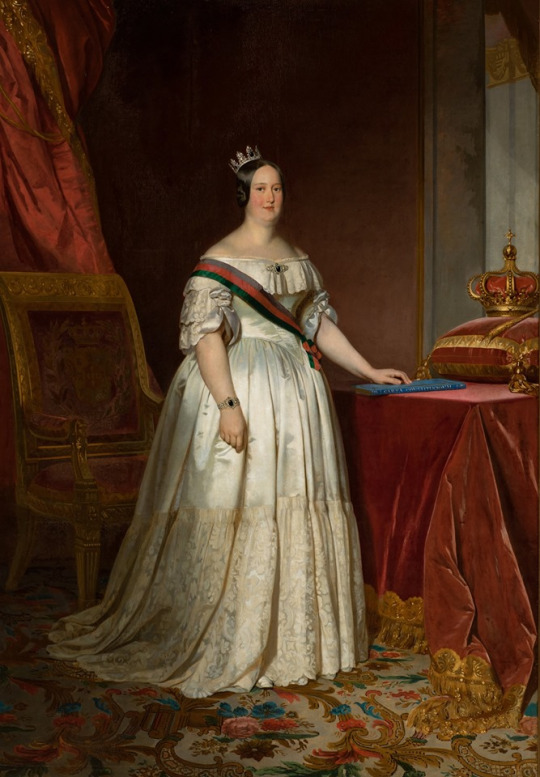
Reign: 26 May 1834 – 15 November 1853 Acclamation: 20 September 1834 Predecessor: Pedro IV
Maria II (4 April 1819 In Rio de Janeiro – 15 November 1853 in Lisbon) "the Educator" ("a Educadora") or "the Good Mother" ("a Boa Mãe"), reigned as Queen of Portugal from 1826 to 1828, and again from 1834 to 1853. Born in Rio de Janeiro, she was the first child of King Pedro IV of Portugal (Pedro I of Brazil) and his first wife, Queen Maria Leopoldina, and thus a member of the House of Bragança. One of the two surviving children born when Pedro was still heir apparent to Portugal, she inherited Portuguese titles and was placed in the line of succession to the former Portuguese throne, even after becoming a member of the Brazilian Imperial Family, from which she was excluded in 1835 after her definitive ascension to the Portuguese throne.

Maria II was born Maria da Glória Joana Carlota Leopoldina da Cruz Francisca Xavier de Paula Isidora Micaela Gabriela Rafaela Gonzaga on 4 April 1819 in the Palace of São Cristóvão
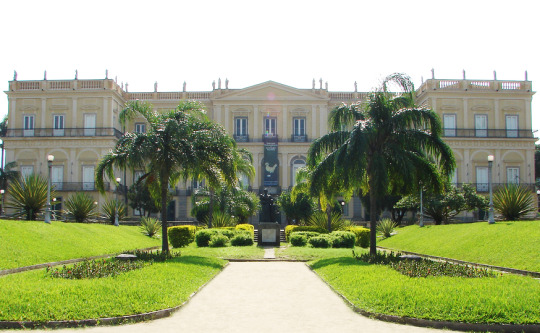
in Rio de Janeiro, Kingdom of Brazil. She was the eldest daughter of the Prince Pedro de Alcântara, future King of Portugal as Pedro IV and first Emperor of Brazil as Pedro I, and his first wife Maria Leopoldina (née Archduchess Caroline Josepha Leopoldine of Austria), herself a daughter of Francis II, Holy Roman Emperor. She was titled Princess of Beira upon her birth. Born in Brazil, Maria was the only European monarch to have been born outside of Europe, though she was still born in Portuguese territory.
The death of Maria's grandfather, King João VI, in March 1826 sparked a succession crisis in Portugal. The king had a male heir, Pedro,

but Pedro had proclaimed the independence of Brazil in 1822 with himself as Emperor. The late king also had a younger son, Miguel,
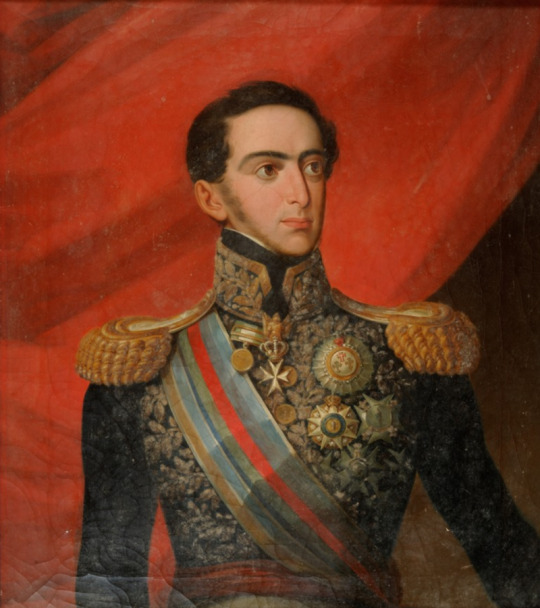
but he was exiled to Austria after leading a number of revolutions against his father and his liberal regime.
Before his death, the king had nominated his favourite daughter, Isabel Maria, to serve as regent until "the legitimate heir returned to the kingdom" — but he had failed to specify which of his sons was the legitimate heir: Pedro, the liberal Emperor of Brazil, or Miguel, the absolutist exiled prince.
Most people considered Pedro to be the legitimate heir, but Brazil did not want him to unite Portugal and Brazil's thrones again. Aware that his brother's supporters were ready to bring Miguel back and put him on the throne, Pedro decided for a more consensual option: he would renounce his claim to the Portuguese throne in favour of his daughter Maria (who was only seven years old), and that she was to marry her uncle Miguel, who would accept the liberal constitution and act as a regent until his niece reached majority.
Miguel pretended to accept, but upon his arrival in Portugal he immediately deposed Maria and proclaimed himself king, abrogating the liberal constitution in the process. During his reign of terror, Maria traveled to many European courts, including her maternal grandfather's in Vienna, as well as London and Paris.
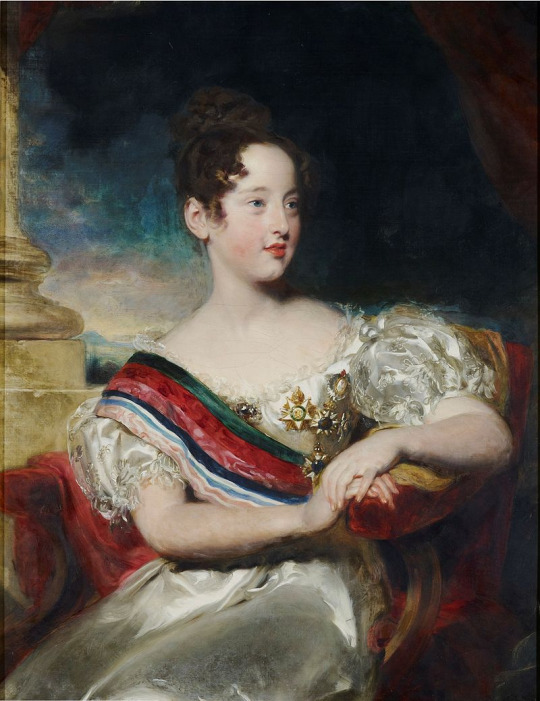
Maria's first reign was interrupted by the absolutist uprising led by her uncle, fiancé and regent Miguel, who proclaimed himself King of Portugal on 23 June 1828. Then began the Liberal Wars that lasted until 1834, the year in which Maria was restored to the throne and Miguel exiled to Germany.
The Marquis of Barbacena,
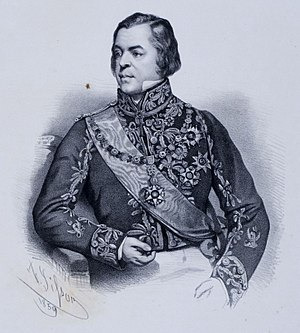
arriving in Gibraltar with the princess on 3 September 1828, was informed by an emissary of what was happening in Portugal. He had the foresight to understand that Miguel had come from Vienna determined to put himself at the head of the absolutist movement, advised by Prince Klemens von Metternich,

who was directing European politics, and so it was dangerous for the young Queen to go to Vienna. Taking responsibility, he changed the direction of the journey, and departed for London, where he arrived on 7 October. English policy was not conducive to its purpose. The Duke of Wellington's
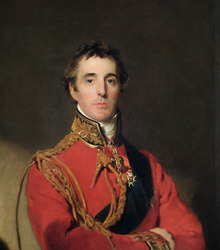
office openly sponsored Miguel, so the asylum the Marquis had sought was not safe. Maria II was received in court with the honors due to her high hierarchy, but the British prevented their subjects there emigres to go to reinforce the garrison of the island Terceira.
Miguel's coup d'état had not gone unrevealed. On 16 May 1828, the garrison of Porto revolted, and in Lagos an infantry battalion. The revolts were stifled. Saldanha, Palmela, and others, who had come to take charge of the movement in Porto, re-embarked on Belfast ship, which had brought them; the Porto garrison, reinforced by the academic volunteers of Coimbra and other liberal troops, emigrated to Galiza and from there to England. At the head of a small liberal expedition, the Marquis of Saldanha attempted to disembark in Terceira, Azores, but was not allowed to take the English cruise, whose vigilance he could not avoid for some time after the Count of Vila Flor, later of Terceira, was able to disembark. In time, because in August 1829 appeared in front of the island a huge Miguelist squad that sent to soil a body of disembarkation. Then there was the Battle of August 11 in the village of Praia, where the miguelists were defeated. When the emigrants in England received the news of the victory, they felt great enthusiasm. They soon lost hope of knowing that the young queen was returning to the Brazilian Empire to her father. In fact, the situation of Maria II in the English court, next to the ministry in the power, became embarrassing and humiliating. The Queen left London to meet her future stepmother, Amélie of Leuchtenberg.
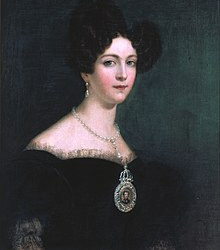
They left together on 30 August 1829 for Rio de Janeiro, arriving on 16 October.
The constitutional cause was thought to have been lost. The dispersed emigres (France, England and Brazil) were divided into rival factions. Only Terceira Island recognized the constitutional principles, and even there appeared miguelists guerillas. France was ready to recognize Miguel's government when the revolution of July broke out in Paris in 1830, which encouraged the Portuguese liberals.
In 7 April 1831, Pedro IV abdicated the imperial crown of Brazil on behalf of his son Pedro II,
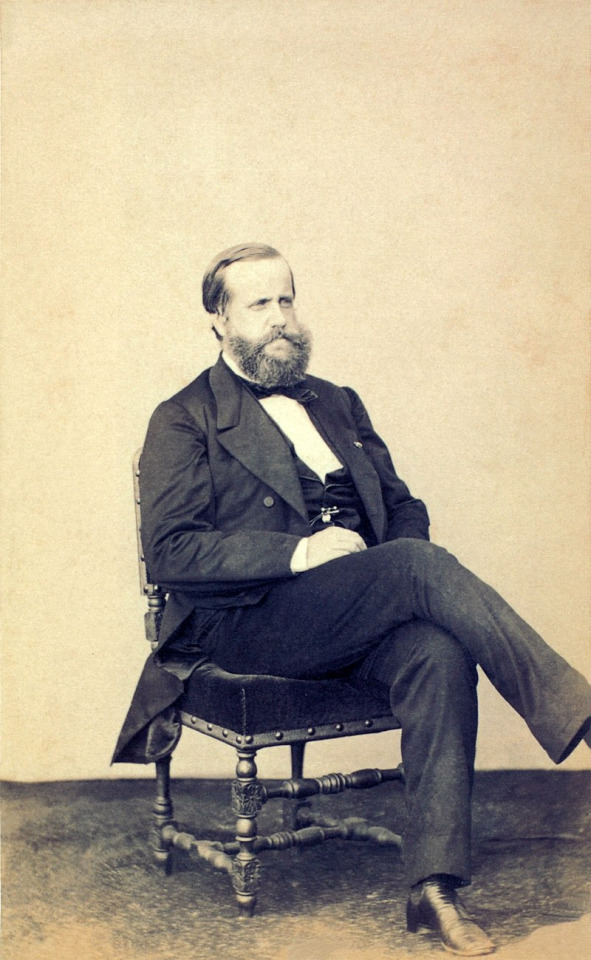
Maria's younger brother, and came to Europe with his daughter and his second wife, to support his daughter's rights to the crown from Portugal and joined the forces loyal to Maria in the Azores in their war against Miguel. He took the title of Duke of Bragança, and Regent in her name.
Almost at the same time the regency of the Ilha Terceira, named by Pedro and composed of the Marquis of Palmela, the Count of Vila Flor and José António Guerreiro, prepared an expedition that soon took possession of the Azores. While extending the constitutional territory, Pedro disembarked in France, being welcomed with sympathy by the new government and by Louis Philippe I.
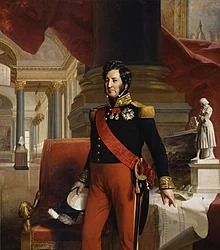
Miguel's government had defied the immunities of French subjects, had not at once satisfied the complaints of the French government, which had sent a squadron commanded by Admiral Roussin to force the bar of Lisbon and impose humiliating conditions of peace.
Pedro left his daughter in Paris to finish her education, delivered to her stepmother, Empress Amélie, with good masters, and left for the Azores at the head of an expedition organized on the island of Belle Isle, bringing his supporters together. Arriving in the Azores on 3 March 1832, he formed a new ministry, assembled a small army, whose command he gave to the Count of Vila Flor, and carried him aboard a squadron which he delivered to the English officer Sartorius, and departed for mainland Portugal. July 8 at Memória Beach in Matosinhos. It was followed by the Siege of Porto and a series of battles until, on 24 July 1833, the Duke of Terceira entered victorious in Lisbon, having won the Battle of Cova da Piedade the day before. Porto and Lisbon, the main cities, were in the power of the liberals. Pedro came to Lisbon, and summoned his daughter from Paris, forcing his brother, Miguel to abdicate in 1834. Maria was thereupon restored to the throne, and obtained an annulment of her betrothal. Soon after her restoration to the throne, her father died from tuberculosis.
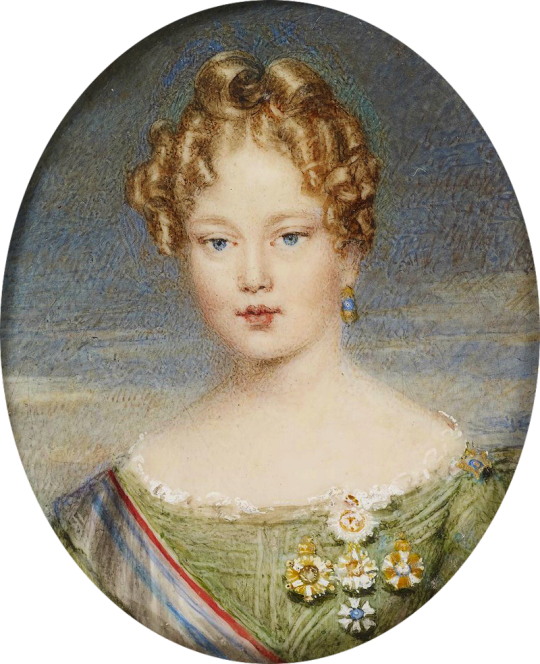
On 7 February 1833, in order to protect the Queen, the 2nd Lancers Regiment was created, first known as the Regimento de Lanceiros da Rainha (Queen's Lancers Regiment), with the motto Morte ou Glória, "Death or Glory" (the same as the 17th Lancers, since Lt. Col. Sir Anthony Bacon was its first commander), a fortunate coincidence since the queen's name was Maria da Glória.
Occupying the Portuguese throne, Maria II was still heir presumptive to her brother Pedro II as Princess Imperial of Brazil, until her exclusion from the Brazilian line of succession by law no. 91 of 30 October 1835.
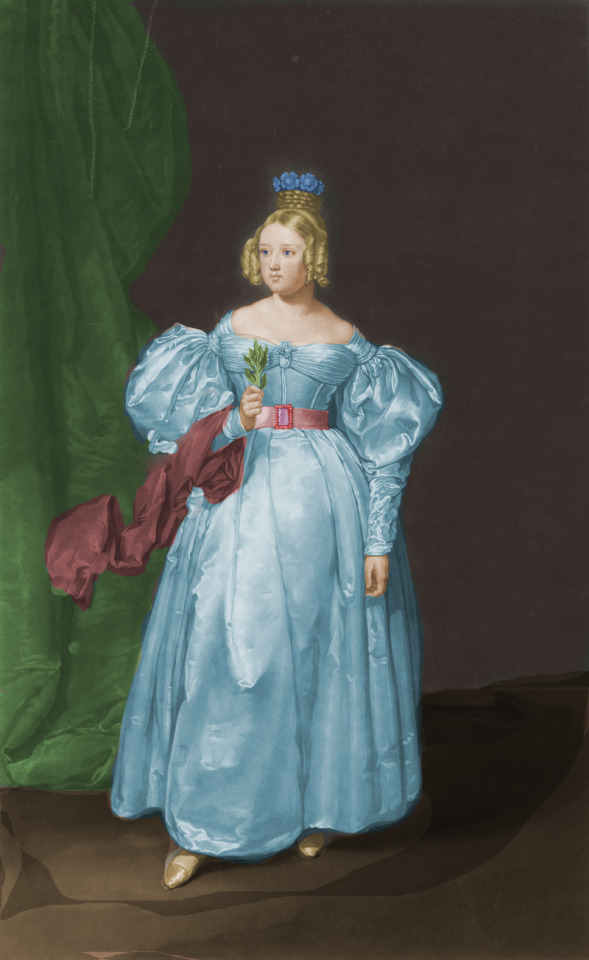
Maria married Auguste, Duke of Leuchtenberg,
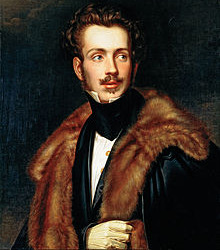
son of Eugène de Beauharnais
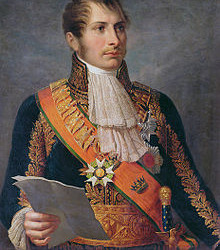
and grandson of the Empress Josephine of France,
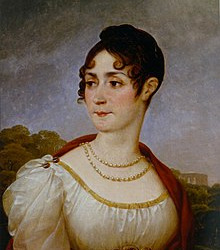
on 26 January 1835, at the age of fifteen. However, he died only two months later, on 28 March 1835.
On 9 April 1836, she married the cultured and able Prince Ferdinand of Saxe-Coburg and Gotha. In accordance with Portuguese law, Ferdinand received the title of king upon the birth of their first child and heir, Pedro.
In 1842, Pope Gregory XVI

presented Maria with a Golden Rose.

Maria's reign saw a revolutionary insurrection on 16 May 1846, but this was crushed by royalist troops on 22 February 1847, and Portugal otherwise avoided the European Revolution of 1848. Maria's reign was also notable for a public health act aimed at curbing the spread of cholera throughout the country. She also pursued policies aimed at raising the levels of education throughout the country.
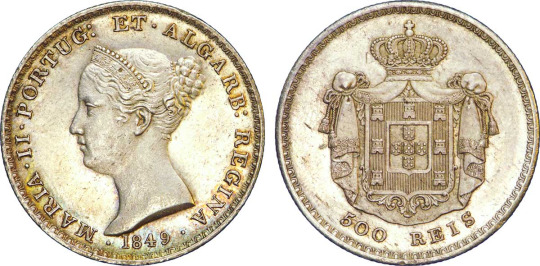
From her first pregnancy, at the age of eighteen, Maria II faced problems in giving birth, with prolonged and extremely difficult labor. An example of this was her third gestation, whose labor lasted 32 hours, after which a girl was baptized in articulo mortis with the name of Maria (1840).
At 25 years of age and in her fifth gestation, the sovereign became obese and her births became even more complicated. In 1847, the fetal distress that preceded the birth of her eighth child – the Infante Augusto, Duke of Coimbra – brought to the world a child "quite purple and with little breathing".
The dangerous routine of successive pregnancies, coupled with obesity (which eventually caused her heart problems) and the frequency of dystocic births (worrisome, especially as a multiparous woman) led doctors to warn the queen about the serious risks she would face in future pregnancies. Indifferent to the warnings, Maria II merely replied: "If I die, I die at my post."
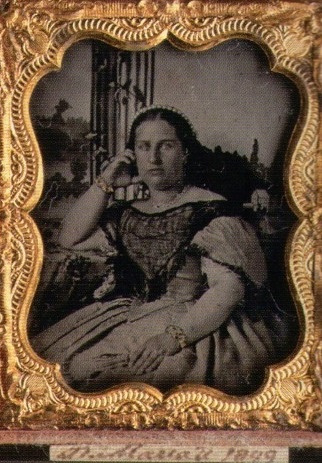
On 15 November 1853, thirteen hours after the onset of labor of the stillborn infant Eugenio, her eleventh child, Maria II died at the age of 34. The announcement of death was published in the Government Gazette of November 16, 1853:
“Paço das Necessidades, November 15, 1853, at half an hour after noon.
Her Majesty the Queen began to notice announcements of childbirth at nine-thirty on the night of the day. Difficulties appeared in the progress of the same childbirth, which forced the doctors to resort to operations, for which the extraction of an infant was obtained, of time, which received the baptism before being extracted.
The result of these operations took place at ten o'clock in the morning. Unfortunately, after an hour and a half, Her Majesty, exhausted from all strength, declared "I surrender my soul to God after having received all the sacraments."
In a letter dated November 28, 1853, the Duchess of Ficalho, the queen's maid, reported the outcome to her brother, the 2nd Earl of Lavradio:
“At two o'clock after midnight from the 14th to the 15th, I was ordered to go to the Palace, where I arrived at about three o'clock. I found the Empress in the Queen's room, where I immediately entered, thinking Her Majesty troubled and even little then we left the immediate room and asked Teixeira what he thought, telling us: "Your Majesty is going well, but slowly." I did not like it, and it was like that, until Teixeira called the doctors, who were out and who had not seen the Queen, and as soon as they examined her, the horrible operation was decided: the doctors were Teixeira, Farto, Kessler, Elias and Benevides. Kessler immediately dismissed the case as very dangerous. The operation was begun. I climbed onto the bed. On the right side, the Empress, full of tears; the Queen, with no fainting, but with a very bad opinion, and, complaining that she was suffering enough, said in her natural voice: "O Teixeira, if I am in danger, tell me, do not deceive me."
Queen Maria II is remembered as a good mother and a kind person who always acted according to her convictions in her attempt to help her country. She was later given the nickname "The Good Mother."
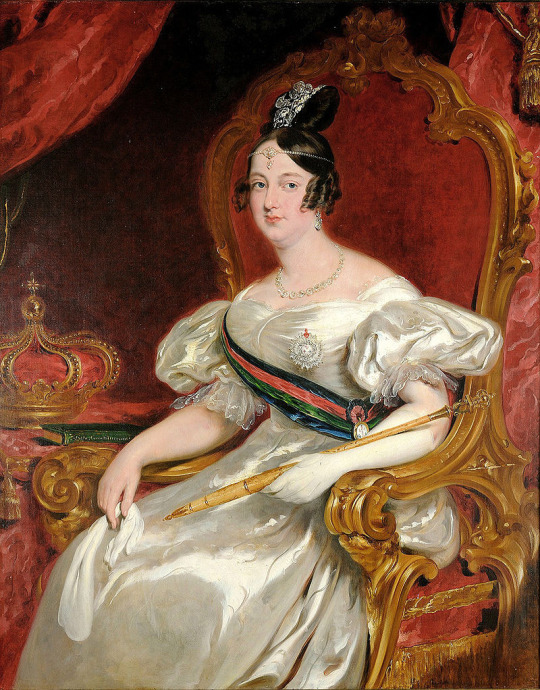
She was buried in the Bragança Pantheon,in Monastery of São Vicente de Fora. :

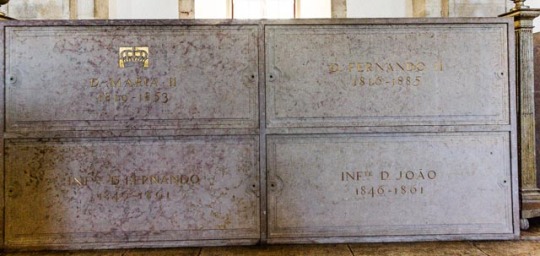
Maria first married Auguste Charles, 2nd Duke of Leuchtenberg, son of Eugène de Beauharnais, grandson of Empress Josephine, who died soon after arriving in Portugal. She then married Ferdinand of Saxe-Coburg and Gotha, son of Prince Ferdinand Georg August of Saxe-Coburg and Gotha and his wife Princess Maria Antonia Koháry de Csábrág.
Pedro (16 Setember 1837 - 11 November 1861) Succeeded his mother as Pedro V, King of Portugal.
Luís (31 October 183819 October 1889) Succeeded his brother, Pedro, as King of Portugal.
Infanta Maria (4 October 1840) Stillborn daughter.
Infante João (16 March 1842 - 27 December 1861) Duke of Beja
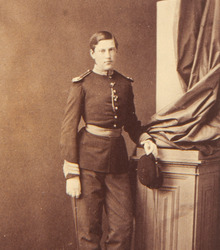
Infanta Maria Ana (21 August 1843 - 5 February 1884) Married King George of Saxony and was the mother of King Frederick August III of Saxony.
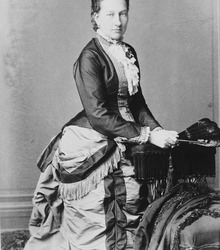
Infanta Antónia (17 February 1845 - 27 December 1913) Married Leopold, Prince of Hohenzollern, and was the mother of King Ferdinand I of Romania.

Infante Fernando of Portugal (23 July 1846 - 6 November 1861) Died of cholera at age 15.
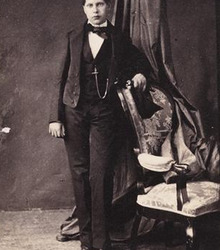
Infante Augusto (4 November 1847 - 26 September 1889) Duke of Coimbra

Infante Leopoldo (7 May 1849) Stillborn son.
Infanta Maria da Glória (3 February 1851) Stillborn daughter
Infante Eugénio (15 November 1853) Died some hours after the death of his mother.
10 notes
·
View notes